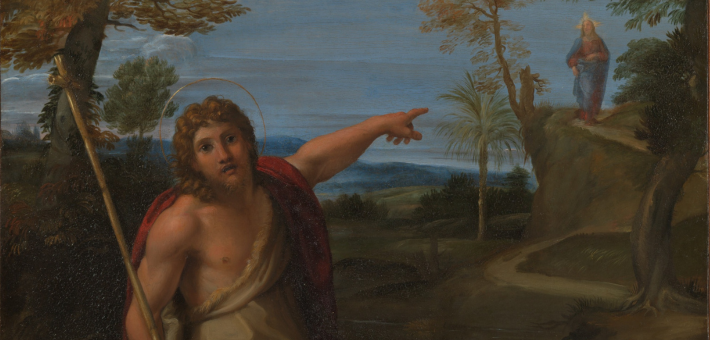Commentary on Zephaniah 3:14-20
What would happen if God interrupted us?1
What if God barged into the midst of our daily lives, if God made God’s presence known? How would you feel? How would you respond? What change would God’s presence bring? The prophet Zephaniah wrestles with these very questions.
In Zephaniah’s visions the presence of God brings both judgment and joy. The oracles in the majority of the book announce cosmic destruction as divine judgment for the sins of Israel and, specifically, the priesthood. With vivid and at times disturbing language, the prophet envisions the arrival of the Day of the Lord, the time in which God will act to restore justice and to bring judgment on faithless, sinful nations.
The Day of the Lord, promises the prophet, “will be a day of wrath, a day of distress and anguish, a day of ruin and devastation, a day of darkness and gloom, a day of clouds and thick darkness” (Zephaniah 1:15–16). The arrival of the Day of the Lord represents a calling to account that demands repentance and humility before God’s mighty judgment.
It is in this context that the final oracle of the book has such striking resonance. Its tone shifts dramatically as the arrival of God’s presence brings celebration and cause for joy. It is a grand reversal as the expected judgment instead becomes overwhelming mercy that leads to new life: “Rejoice and exult with all your heart, O daughter Jerusalem! The LORD has taken away the judgments against you, he has turned away your enemies. The king of Israel, the LORD, is in your midst; you shall fear disaster no more” (Zephaniah 3:14b–15).
The arrival of God’s presence dispels fear. It opens the door to a new future.
The book of Zephaniah is set during the reign of King Josiah (640–609 BCE), Israel’s reforming monarch, though some of the visions in the book, including the final oracle, may reflect a later exilic or postexilic perspective. In the context of Josiah’s reign, God’s presence is disturbing; it upsets the complacencies and faithless habits of the people. It undermines hypocrisy and indifference.
God vows, “At that time I will search Jerusalem with lamps, and I will punish the people who rest complacently on their dregs, those who say in their hearts, ‘The LORD will not do good, nor will he do harm’” (Zephaniah 1:12). God’s presence will surprise those who assume that God is a benign, indifferent deity who is of little consequence to the reality of daily life.
God’s presence will also disturb the ones who vow faith in YHWH in one breath, but in the next breath worship other gods: “I will cut off from this place every remnant of Baal and the name of the idolatrous priests … those who bow down and swear to the LORD, but also swear by Milcom; those who have turned back from following the LORD, who have not sought the LORD or inquired of him” (Zephaniah 1:4b-6).
This language sounds harsh to our modern ears, but have we, too, succumbed to indifference? Do we, too, worship other gods while professing faith in YHWH? What if God interrupted us in the midst of daily life? What would God find? Do our actions match our faith commitments? Do we live in a state of readiness for God’s presence to enter our midst, or instead do we live in the indifferent conviction that God will do neither harm nor good?
It is tempting to jump right to the final oracle of the book and proclaim the good news that God’s presence brings joyful celebration. And indeed this is the message of the book, of the Advent season, and of Christian faith: “The LORD, your God, is in your midst … he will renew you in his love” (Zephaniah 3:17); “For God so loved the world that he gave his only Son” (John 3:16).
Yet this message has its deepest significance when set in contrast to what has come before. Despite the people’s indifference, despite their hypocrisy, despite the cause for cosmic judgment, God’s entry into the world brings celebration, restoration, and new life.
If the final oracle of Zephaniah was penned in the exilic or postexilic era, it addresses Israel at a time in which they had experienced great shame on the world stage. The nation had been ravaged by conquering armies of foreign nations. Its people scattered, Israel lived in fear and disorientation.
To this hurting people, God promises a new world: “The LORD has taken away the judgments against you, he has turned away your enemies. The king of Israel, the LORD, is in your midst; you shall fear disaster no more” (Zephaniah 3:15). Jerusalem, which earlier in the book was described as a violent and unfaithful city, is here personified as a woman rejoicing in song (3:14).
Not only does God’s presence bring a joy that casts out fear, but it also brings the restoration of justice and aid to the poor: “I will save the lame and gather the outcast, and I will change their shame into praise and renown in all the earth” (Zephaniah 3:19b). God’s presence brings a new way of life in which the way people relate to God and one another is fundamentally different.
What would happen if God interrupted us? What in our world would change? What fears would be dispelled? What injustices overturned?
Notes
- Commentary previously published on this website for December 13, 2015.


December 15, 2024